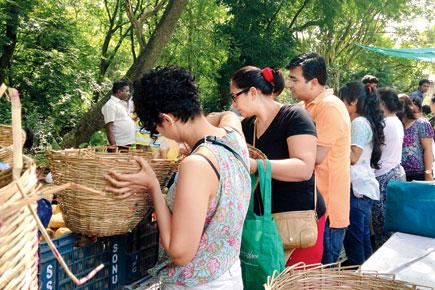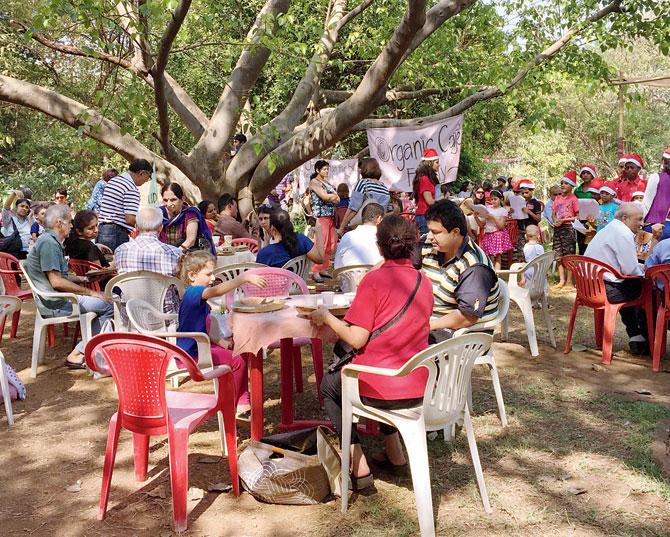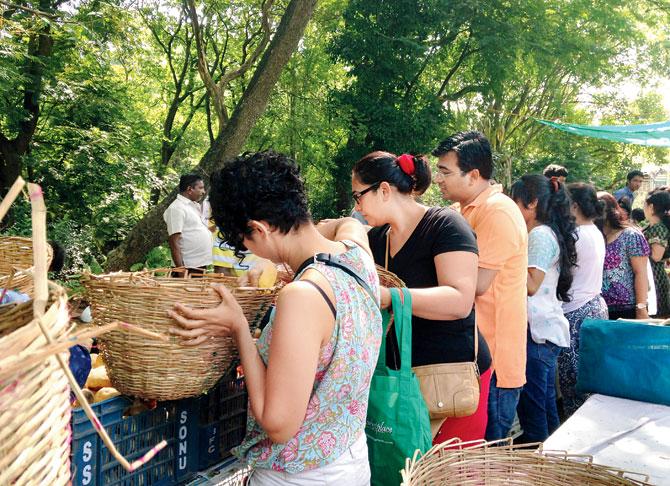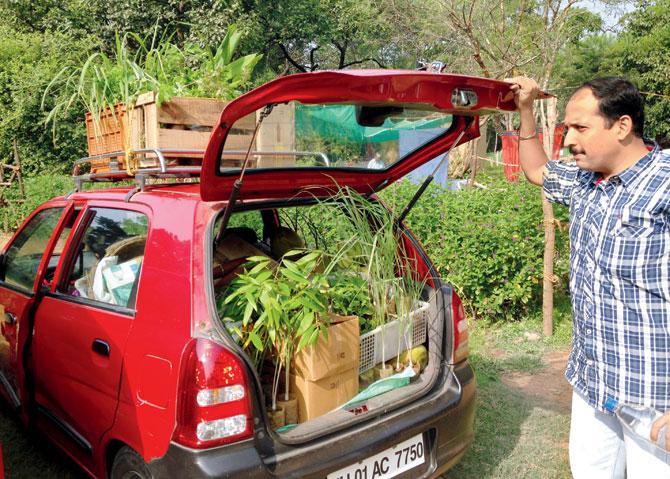Last week, Slow Food International, which spreads awareness on the goodness of locally-sourced, natural food, launched its Mumbai chapter. Phorum Dalal asks experts how to make a good, fair and clean choice for sustainable food habits

People go through produce laid out for sale at the farmers market
Two years ago, as I walked through the Grant Road vegetable market, my eyes fell on a lush green broccoli. My hands reached out to touch its rough head, when my companion, Kavita Mukhi, rapped my knuckles. “That is an exotic vegetable, which means it is not indigenous to the state, and thus, not very good for you. Restrict to eating it just once a week, as it is laden with chemicals,” the eco-nutritionist who initiated the Farmers' Market told me, handing me a locally produced pumpkin and urging me to smell it. That was my first lesson on the importance of consuming local and seasonal produce.
ADVERTISEMENT

Visitors dig into organic food at the farmers’ market café last year
Last week, Slow Food International, a global, non-profit organisation founded in Rome to prevent the disappearance of local food cultures and traditions by a journalist named Carlo Petrini in the 1980s, launched its Mumbai chapter Slow Food Mumbai (SFM) — drawing attention, yet again, to take a closer look at the pattern of our food consumption. The convivium leader Arina Suchde says the slow food movement aims to get people to go back to the roots of simple and unprocessed food. “Our grandparents lived healthier lives than us, as they were not victims of lifestyle diseases and processed food. We want Mumbai to value where our fruits and veggies are grown, and recognise the efforts of the farmers who grow them,” she adds.

People go through produce laid out for sale at the farmers' market
The organisation follows a simple philosophy of good, clean and fair choices. “Healthy food can be great in taste, it should be sourced from a producer who grows his fruits and vegetables in a sustainable manner and for this, he should get a fair payment for his efforts. The word organic is misused today. We prefer to call it natural, where it may be produced using minimum quantity of safe chemicals,” says Kumud Dadlani, facilitator for Slow Food Mumbai and Maharashtra.

A buyer stocks his car with plants and herbs for his garden
The outfit’s initial plans include educating people about seasonal produce, indigenous grains and local variety of seafood. “We want to start a newsletter that would have profiles of sustainable farmers and what they grow under an initiative called ‘know your farmer’. We want to focus on cuisine of Mumbai culture, history talks, and dying foods of the city, conduct tasting workshops and involve children through school and community garden projects. Connecting with chefs and food personalities for talks and demos is also on the cards,” says Dadlani who has studied at the University of Gastronomic Sciences in Italy started by Petrini in 2004.
Be the change
The city is not new to the concept of slow food and has seen its fair share of farmers’ markets. “Mumbai has so much diversity when it comes to food but people are obsessed with fast food,” says Dadlani. The first step to bringing about change in eating habits is to start asking questions. “Ask your vendor what is in season, as that is best for you. Today, fruits from different parts of the world are available at local markets, but is it good for you? We have green apple available round the year, or fruits such as apples and pears from China and New Zealand, has anyone thought about the carbon footprints they leave behind, and the amount of chemical treatments to ensure they remain ‘fresh’ by the time they reach us? This is a game of demand and supply. They are so popular in the city as the consumers demand it,” says Dadlani. Currently, the Mumbai chapter has five core team members. “We cannot spread the movement on our own, we want people to tell us what is wrong, join us at events, volunteer and share their ideas,” explains Dadlani.
Farm to fork
SFM is also looking to partner with like-minded groups and projects. Yohaan Dattoobhai, founder of Kaboom, is one of their first partners. For him, the organisation is a great platform to raise awareness of the major issues surrounding cultures, educate communities on what can be done to inspire change. “A year ago, when I was looking to do something entrepreneurial, I realised that our city lacks access to good quality food at an affordable price. According to a US-based research, we are the first generation that will raise children who will die at a younger age than us due to the food we consume and the lifestyle we lead,” says Dattoobhai. Even condiments such as ketchup, tahini, hot sauce, mustard sauce are made from scratch at the restaurant which serves a different cuisine every day. “It requires a little extra effort and cost but is the culture at Kaboom. We source our produce directly from farms, which helps us save cost and thus we can make the food less expensive for customers,” he says. Mukhi, too has joined hands with the Slow Food Slow Food Mumbai Earth Market which is part of SFM. “I attended a Slow Food International event in Italy a few years ago. I got the feel of consuming food the old-fashioned way. I attended lectures, ate lavish (not rich) meals. When you eat good, wholesome food, you have nothing to lose, but illness,” says Mukhi. The Farmers' Market in Mumbai is now also part of Slow Food's Earth Market network and holds Slow Food events as part of its activities.
Demand more supply
The common argument is that organic and slow food is more expensive than the regular produce available in the market. “If more people buy local and seasonal, go to farmer’s market and the demand increases, the price will go down. To participate in a farmer’s market in a city, a farmer harvests his crop early Sunday, to keep it as fresh as possible and drives all the way to the city. Why is the city not responding?” says Dadlani.
SFM also promotes well procured and stocked meats such as gauthi chicken. According to trend reports, eggs are the food of the year. “The eggs in Mumbai are full of chemicals, while organic eggs or Keggs are a fresher option,” says Dadlani, who also plans to streamline the fish markets. “Everyone wants to eat pomfret, as they consider the oily bangda a poorman’s fish and reject the mandel for not clean enough. But these are beautiful local fish,” she says adding, “Children of farmers, who have seen their parents work long hours in the field do not want to continue the legacy. Instead, they prefer coming to the city to do odd jobs. Have you ever thought who will grow our food then?” Dadlani signs off.
 Subscribe today by clicking the link and stay updated with the latest news!" Click here!
Subscribe today by clicking the link and stay updated with the latest news!" Click here!






